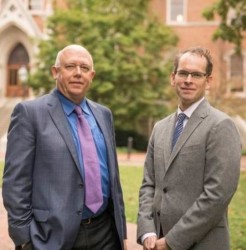Nashvillians gave very high marks to the city's institutions and elected officials for their response to the COVID-19 crisis, but residents' economic anxiety levels are high as the city faces hard times and tough financial decisions, according to the latest Vanderbilt Poll-Nashville.
The survey of 1,036 registered Davidson County voters took place between April 9-May 10, 2020, and covered a range of topics important to city residents. The annual poll is conducted by Vanderbilt University's Center for the Study of Democratic Institutions (CSDI), directed by John Geer, Ginny and Conner Searcy Dean of the College of Arts and Science, and Josh Clinton, Abby and Jon Winkelreid Professor of Political Science. The margin of error is ±4.3 percent.
Many approval ratings sky-high, but may not last
Mayor John Cooper posted an 80 percent approval rating in the new poll. This is the highest approval rating of any mayor since the first Vanderbilt Poll-Nashville was conducted in 2015. Mayor Cooper's support crossed party lines, too-70 percent of Republicans approve of the job he is doing and 86 percent of Democrats agree. The new Metro Nashville Schools Director Adrienne Battle also received high marks, with 79 percent of respondents approving of the job she has done so far.

Approval of Congressman Jim Cooper also increased significantly, with 76 percent of Davidson county residents approving of the job he has done so far this year. President Trump's approval remained largely unchanged, however-only 33 percent of residents approved of the job being done in the White House.
Metro Nashville's public institutions also received record-high approval ratings during the ongoing pandemic. Support for the Metro Nashville Council rose 13 points to 70 percent this year, and approval of the Metro Nashville School Board jumped from 37 to 68 percent. Residents also continue to think highly of the job being done by the Metro Nashville Police Department, which received 86 percent approval-recovering from a dip last year.
Despite the impact of the pandemic and the recent tornado, Nashvillians continue to believe the city is generally on the right track-63 percent say it's moving in the right direction, up from last year. The city's response to the March tornadoes was also favorably received-85 percent of the public expressed support for the city's response to the disaster.
"Local residents are understandably anxious about the pandemic, but they are very pleased by the response of local officials so far," said Geer. "Mayor Cooper rightly gets a lot of credit for how he's handled the COVID-19 crisis. This support will be invaluable as he wrestles with some difficult decisions ahead concerning budgets and getting the city back on track."
COVID-19 concerns widespread
Nashville voters are worried about the spread of COVID-19, with 52 percent reporting feeling very concerned that they or someone close to them would get sick, and an additional 30 percent saying they are somewhat concerned.
Voters also strongly endorsed the social distancing policies being used to help mitigate the spread of COVID-19:
- 96 percent supported closing schools
- 95 percent supported canceling large gatherings such as sporting events and concerts
- 84 percent supported restricting travel
- 90 percent supporting stay-at-home policies
- 85 percent supporting closing non-essential businesses.
In their personal lives, 74 percent said they practice social distancing strictly, while another 20 percent said they stick to it most of the time.
"Despite people in Davidson County being willing to support social distancing, we do see some partisan differences in attitudes toward COVID-19," said Clinton. "Democrats and Independents are much more likely to be very worried about catching COVID-19 than Republicans and, perhaps as a result, Republicans were somewhat less supportive of social distancing policies than Democrats and Independents."
Economic anxiety rising
Despite strong support for the city's leadership during the pandemic, residents are increasingly worried about their financial futures. Just 62 percent of voters rated the city's economy as very or fairly good compared to last year's 82 percent, the poll found.
Furthermore, when asked about how they think COVID-19 will impact their own pocketbooks, 57 report feeling very or moderately worried about not having enough for emergencies, 52 percent worried about being unable to pay monthly bills, 58 percent worried about saving for retirement and education and 54 percent worried they or someone in their household will lose their job, hours or wages.
Voters were also asked how best to address the budget crisis: According to poll responses, public support for cutting affordable housing and raising property taxes was higher than support for cutting funding for public schools and public safety.
While economic concerns are widespread, there were some partisan differences. "Republicans are significantly less worried about the economic impacts of COVID-19 on their personal finances than Democrats and Independents," Clinton said. "And while Nashvillians are broadly united on protecting public school funding, Democrats and Independents are more likely to prefer raising property taxes to solve the city's budget problems, while Republicans are more willing to prioritizing cuts in affordable housing."
The Vanderbilt Poll-Nashville also reported updated results on voters' opinions about the city's growth, priorities, charter schools and more. All findings and methodology are available at vu.edu/poll.
About the Vanderbilt Poll
The Vanderbilt Poll of Nashville is supported by the Center for the Study of Democratic Institutions at Vanderbilt University. This poll is typically conducted once a year. In 2015, the Vanderbilt Poll became a charter member of the American Association for Public Opinion Research's Transparency Initiative.






